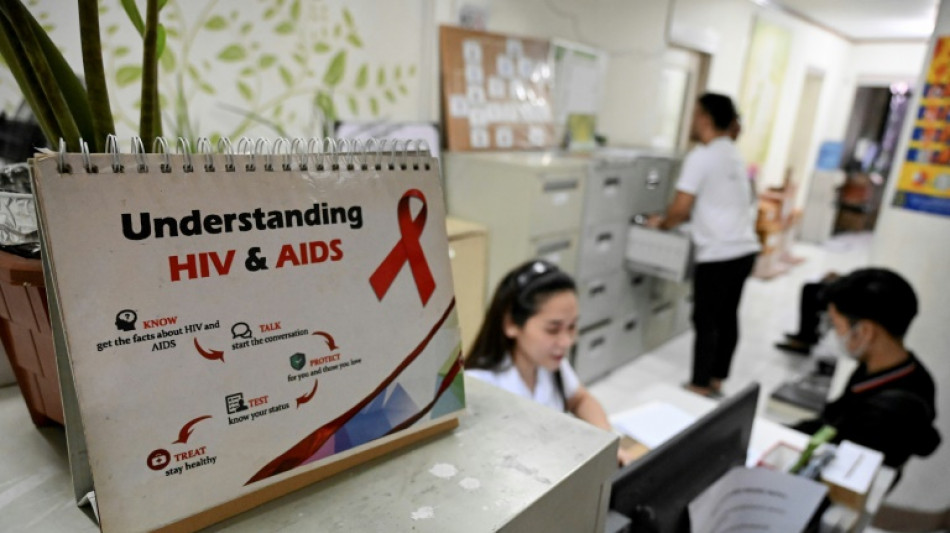
-
 Spain's exiled king recounts history, scandals in wistful memoir
Spain's exiled king recounts history, scandals in wistful memoir
-
Wall Street stocks steady after positive jobs data

-
 Trump blasts Democrats as government shutdown becomes longest ever
Trump blasts Democrats as government shutdown becomes longest ever
-
Indian pilgrims find 'warm welcome' in Pakistan despite tensions

-
 Inter and AC Milan complete purchase of San Siro
Inter and AC Milan complete purchase of San Siro
-
Swedish authorities inspect worksite conditions at steel startup Stegra

-
 Keys withdraws from WTA Finals with illness
Keys withdraws from WTA Finals with illness
-
Prince Harry says proud to be British despite new life in US

-
 EU strikes last-ditch deal on climate targets as COP30 looms
EU strikes last-ditch deal on climate targets as COP30 looms
-
Stocks retreat as tech bubble fears grow

-
 Shein opens first permanent store amid heavy police presence
Shein opens first permanent store amid heavy police presence
-
West Indies edge New Zealand despite Santner brilliance

-
 French pair released by Iran await return home
French pair released by Iran await return home
-
German factory orders up but outlook still muted

-
 Death toll tops 100 as Philippines digs out after typhoon
Death toll tops 100 as Philippines digs out after typhoon
-
Attack on key city in Sudan's Kordofan region kills 40: UN

-
 'No one could stop it': Sudanese describe mass rapes while fleeing El-Fasher
'No one could stop it': Sudanese describe mass rapes while fleeing El-Fasher
-
Champagne and cheers across New York as Mamdani soars to victory

-
 Medieval tower collapse adds to Italy's workplace toll
Medieval tower collapse adds to Italy's workplace toll
-
BMW boosts profitability despite China, tariff woes

-
 South Africa's Wiese wary of 'hurt' France before re-match
South Africa's Wiese wary of 'hurt' France before re-match
-
Beyond limits: Croatian freediver's breathtaking record

-
 Tottenham supporting Udogie after alleged gun threat in London
Tottenham supporting Udogie after alleged gun threat in London
-
Thunder roll Clippers to stay unbeaten as SGA keeps streak alive

-
 In appeal, Australian mushroom murderer alleges 'miscarriage of justice'
In appeal, Australian mushroom murderer alleges 'miscarriage of justice'
-
Toyota hikes profit forecasts 'despite US tariffs'

-
 Ex-France lock Willemse challenges Meafou to become 'the bully'
Ex-France lock Willemse challenges Meafou to become 'the bully'
-
Ukrainians to honour sporting dead by building country they 'died for': minister

-
 At least 7 dead after UPS cargo plane crashes near Louisville airport
At least 7 dead after UPS cargo plane crashes near Louisville airport
-
US Supreme Court hears challenge to Trump tariff powers

-
 US government shutdown becomes longest in history
US government shutdown becomes longest in history
-
India's Modi readies bellwether poll in poorest state

-
 Green goals versus growth needs: India's climate scorecard
Green goals versus growth needs: India's climate scorecard
-
Where things stand on China-US trade after Trump and Xi talk

-
 Sri Lanka targets big fish in anti-corruption push
Sri Lanka targets big fish in anti-corruption push
-
NY elects leftist mayor on big election night for Democrats

-
 Injured Jordie Barrett to miss rest of All Blacks tour
Injured Jordie Barrett to miss rest of All Blacks tour
-
Asian markets tumble as tech bubble fears grow

-
 Pay to protect: Brazil pitches new forest fund at COP30
Pay to protect: Brazil pitches new forest fund at COP30
-
Iraq's social media mercenaries dying for Russia

-
 Young leftist Trump foe elected New York mayor
Young leftist Trump foe elected New York mayor
-
Concerns at ILO over expected appointment of close Trump advisor

-
 Venus Williams to return to Auckland Classic at the age of 45
Venus Williams to return to Auckland Classic at the age of 45
-
No deal yet on EU climate targets as COP30 looms

-
 Typhoon death toll climbs to 66 in the Philippines
Typhoon death toll climbs to 66 in the Philippines
-
NATO tests war preparedness on eastern flank facing Russia

-
 Uncapped opener Weatherald in Australia squad for first Ashes Test
Uncapped opener Weatherald in Australia squad for first Ashes Test
-
Liverpool down Real Madrid in Champions League, Bayern edge PSG

-
 Van Dijk tells Liverpool to keep calm and follow Arsenal's lead
Van Dijk tells Liverpool to keep calm and follow Arsenal's lead
-
PSG left to sweat on injuries to Dembele and Hakimi


Poor education, stigma fuel Philippines' soaring HIV infections
HIV infections are soaring in the Philippines, with experts blaming online dating, poor sex education and conservative attitudes in the deeply religious country for fuelling the spread of the virus.
While less than one percent of the country's more than 110 million people have been diagnosed with HIV, UN data show it has one of the world's fastest-growing epidemics.
Philippine health officials warn the number of people testing positive for HIV every year is accelerating and the caseload could more than double to over 400,000 by 2030.
The vast majority of new infections are among men having sex with men and transgender women.
A growing number are teenagers.
"It's alarming because it shows that we're not yet controlling the epidemic," said Van Phillip Baton, an adviser for the Joint United Nations Programme on HIV/AIDS (UNAIDS) in the Philippines.
Baton warned the virus could spread to the general population if action wasn't taken.
Experts said social media and online dating sites had fanned infections over the past decade by making it easier for people to find sexual partners.
But increased sexual activity, particularly since Covid-19 restrictions were lifted, has not been matched by a greater use of condoms or pre-exposure prophylaxis drugs to prevent infection, said Baton.
Ignorance was a major factor.
A sexual health study by the University of the Philippines' Population Institute in 2021 showed more than a third of young Filipinos aged 15 to 24 did not believe using condoms could reduce the risk of acquiring HIV.
And the proportion of young Filipinos who had heard of HIV and AIDS had fallen to 76 percent -- the lowest level since 1994.
"This means more information needs to be disseminated to correct the perspectives of young people on HIV/AIDS," said Vicente Jurlano, a professor at the Population Institute.
A family planning law that took effect in 2013 after years of opposition from the Catholic Church required government health centres to hand out free condoms and mandated that sex education be taught in schools.
But people aged under 18 need parental permission to receive condoms.
And the education department only began rolling out "comprehensive sexuality education" in 2018 after legal delays, with the main focus on preventing teenage pregnancy.
Rosalie Masilang of the department's curriculum bureau told AFP that HIV was part of sex education and students were informed about condoms, but they were not shown how to use them.
Many schools, however, do not allow the discussion of condoms or sex, said HIV & AIDS Support House co-founder Desi Andrew Ching, whose non-profit organisation teaches sex education in schools.
"Our culture demonises sex," Ching said.
- 'Stigma and discrimination' -
HIV-positive youth often faced discrimination from family and friends, driving some to depression and even suicide, said Krang, who volunteers at an HIV testing and treatment facility in the central city of Iloilo.
Krang, who asked AFP to use his nickname, said he knew very little about HIV before testing positive for the virus in 2018.
The 23-year-old initially kept his result secret for fear of being ostracised.
"The majority of the youth living with HIV are discriminated against by their peers if they tell them," Krang said, with their status posted on Facebook or shared with their teacher.
Even people trying to practise safe sex faced barriers.
In online discussion forums, young Filipinos complain that they had been put off buying condoms at some pharmacies and small stores after being asked for identification cards or ridiculed.
- More testing centres needed -
UNAIDS has set a goal of ending AIDS as a global health threat by 2030, which includes reducing the number of new HIV cases by 90 percent compared to 2010.
While new infections globally fell 38 percent from 2010 to 2022, the Philippines saw a 418 percent increase -- the fastest-growing HIV epidemic in the Asia-Pacific region and the fourth fastest in the world, UNAIDS data show.
With only 63 percent of HIV-positive Filipinos aware of their status and 41 percent on medication -- far below the UNAIDS target of 95 percent -- more testing and treatment centres were needed, particularly outside cities.
HIV can lead to AIDS if untreated. AIDS-related deaths increased 538 percent in the Philippines between 2010 and 2022, compared with a 51 percent drop in the world, UNAIDS data show.
"The only people who die of AIDS these days are those who were diagnosed late," said John Ruiz, medical director of Klinika Bernardo, which offers free HIV services in Manila.
"I really think the entire population should be open to HIV -- for people not to stigmatise the disease, and for those who are infected not to be ashamed."
G.Schmid--VB




